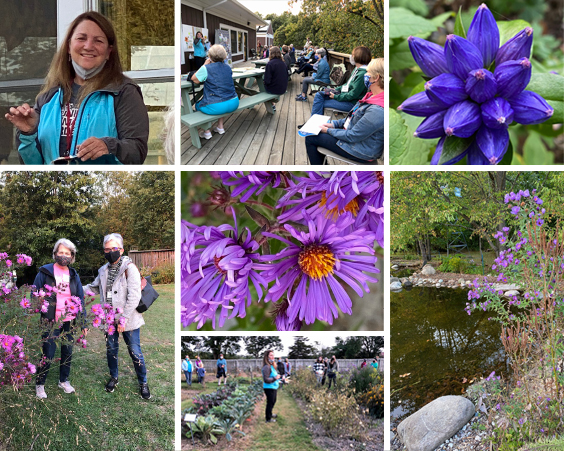
September 2020 Program Recap
A PLEASANT EVENING AT WITTENBACH WEGE CENTER
Masked Wild Ones and friends gathered for our first in–person meeting since February. The weather was perfect to be outside on the back deck to listen to Courtney Cheers, the Wittenbach Wege Center (WWC) director.
Courtney was introduced by Rebecca Marquardt, one of the naturalists at WWC and WORC programs co-chair. We learned some history of WWC from Courtney and then she went on to talk about Sustainable Agriculture, Native Plant Agriculture and Restoration Agriculture—planting sustainably grown native perennial food crops. She said that Michigan is perfect for Sustainable Agriculture because most farms are modestly sized, 200 acres or less, and because Michigan is second to California in the array and diversity of crops and commodities produced here. With such a range of produced goods, our state is already able to get many different products to market.
Some native plants can be grown for Sustainable Agriculture. For example, hazelnuts; they not only are nutritious, but also their hulls burn at a higher BTU than cordwood. Other sustainable crops are native Aronia (black chokeberry), blackberry, blueberry, currants, elderberry, hickory, huckleberry, oak (flour), pawpaw, hickory nuts and pecan (northern strain, Carya illinoinensis), persimmons, Prunus (black cherry, chokecherry and wild plum) and walnut.
Courtney recommended these books:
- Restoration Agriculture: Real-World Permaculturefor Farmers by Mark Shepard
- Native Plant Agriculture: Applicable to the Midwest, South, Northeast and Mid-Atlantic Vol 1 by Indigenous Landscapes
Our group walked around the grounds looking at the abundance of native asters and goldenrods, the rain garden, and the prairie which is in its second year.
Lastly, we toured the Victory Garden with its rows of vegetable crops and raised beds. Students in Lowell are integral in the effort to provide food to the local food pantry, the Flat River Outreach Ministry each year, while satisfying the goal of the Wittenbach family—students should learn where their food comes from! The addition of pollinator strips that bookend the gardens draw honeybees from the managed hives as well as native bees to pollinate the fruits and vegetables.
We thank Courtney and Rebecca for the opportunity to see and hear about the wonderful work they are doing at WWC.

